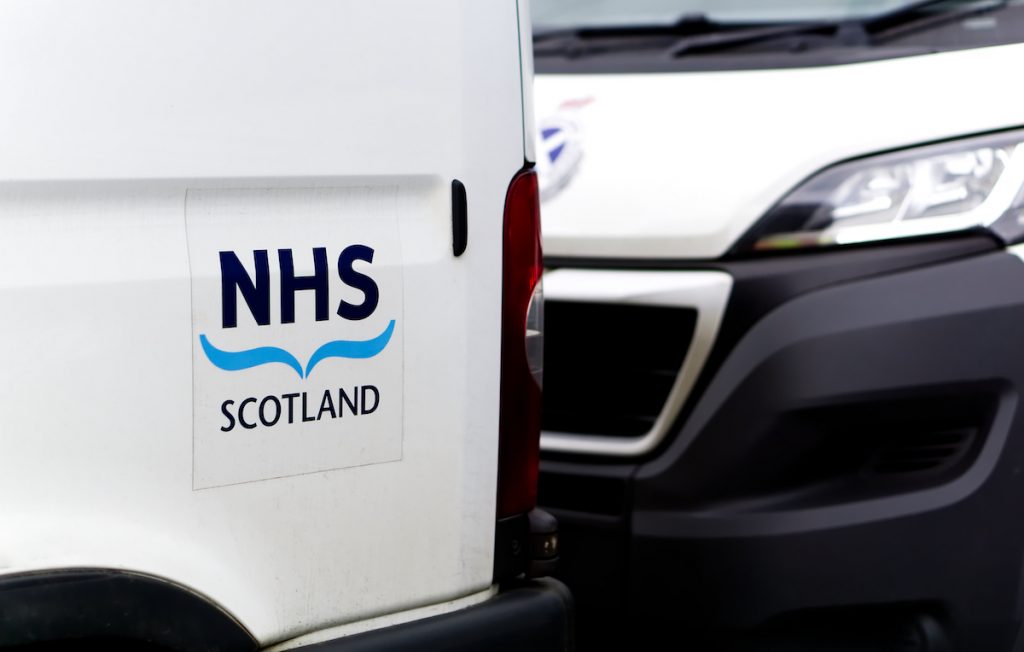The Scottish Government has launched a £1bn programme of investment in the NHS as it seeks to recover from the effects of the Covid-19 pandemic.
First Minister Nicola Sturgeon backed the plan to ‘increase capacity and drive the innovation needed to tackle Covid backlogs’ in a tweet this morning.
The ‘targeted’ investment sets out key actions for the next five years to help address backlogs in healthcare and increase capacity by at least 10 per cent.
The plan outlines a range of reforms across primary and acute NHS services to help recover from the impact of the pandemic, and get everyone the treatment they need as quickly as possible. However opposition parties described the 26-page plan as an ’embarrassingly thin, flimsy pamphlet’ and a drive to ‘suppress demand’ by pushing patients online.
A key aim in primary care is to restore face-to-face GP consultations as quickly and safely as possible, while ensuring everyone can continue to make use of virtual appointments services like NHS Near Me, if preferred. The Scottish Government also said it would bolster the NHS Pharmacy First scheme to enhance the range of services patients can access from community pharmacists without having to go to their GP. It follows an announcement by NHS England yesterday that blood pressure checks will be offered by high street pharmacies, to help distribute the workload among healthcare professionals.
For hospitals, there will be increased capacity for inpatients, day cases, outpatients and diagnostics. Prior to the pandemic, Scotland’s NHS carried out approximately 270,000 inpatient/day cases per year, and approximately 1.4 million outpatient appointments. The plan pledged to increase NHS capacity substantially ‘beyond these levels’ but did not specify a number.
Priority is also to be given to the health and wellbeing of NHS staff who have faced substantial challenges throughout Covid-19.
The First Minister was joined by Health Secretary Humza Yousaf to launch the NHS Recovery Plan during a visit to the new national Centre for Sustainable Delivery (CfSD), which will play a key role in supporting improvements in outpatient and inpatient capacity as well as diagnostics.
She said: “This plan will drive the recovery of our NHS, not just to its pre-pandemic level but beyond.
“As we maintain our resilience against Covid-19 and other pressures, the Scottish Government is providing targeted investment to increase capacity, reform the system and ultimately get everyone the treatment they need as quickly as possible.
“Tackling the backlog of care is essential and will be a priority. But we want to go further than that and deliver an NHS that is innovative, sustainable and stronger than ever before.”
Annie Wells MSP, Scottish Conservative shadow cabinet secretary for health, said: “If this flimsy pamphlet is the best that Humza Yousaf can come up with, Scotland’s NHS is in real trouble.
“This delayed plan is mostly a lift from their manifesto and a regurgitation of undelivered promises from failed SNP health ministers of old.
“It’s embarrassingly thin – made for PR purposes, not for our NHS.
“The SNP have shamefully walked back a key election pledge. They’ve tried to quietly abandon a commitment to remobilise the NHS.
“There is not a single mention of Long Covid. There’s no new funding for A&E, despite waiting times hitting their worst level in six years, and nothing new to tackle alcohol and drug deaths, which have both hit record highs.”
Alex Cole-Hamilton MSP, the newly-elected leader of the Scottish Liberal Democrats, said: “With A&E departments more stretched than ever and more than 200,000 operations lost to the pandemic, patients and NHS staff deserved more than wafer thin commitments and re-packaged promises. The government is chancing on money, redesign and technology to dig them out of a hole.
“This is clear in the plan’s focus on supressing demand and shifting patients online. Doctors have told us that isn’t without its risks. Patients shouldn’t be discouraged from treatment.
Actions include:
- increasing investment in National Treatment Centres (NTCs) to more than £400 million, contributing to delivery of over 40,000 additional elective surgeries and procedures per year
- raising primary care investment by 25%, supporting GPs, community pharmacists, dentists and optometrists
- investing £29 million to target diagnostic backlogs, providing 78,000 additional procedures in 2021/22 rising to 90,000 per year from 2025/26
- providing £8 million to support the mental health and wellbeing of the health and care workforce
- investing £11 million in new national and international recruitment campaigns to produce an additional 1,500 staff over the next five years for our NTCs, 1,000 mental health link workers in communities, 800 more GPs, and boosting paramedic numbers through the £10,000 Paramedic Bursary.
- delivering £23 million to redesign urgent care – with rapid access to a senior clinician via a telephone or video consultation where possible, reducing the pressure on A&E
- devoting £130 million to deliver our National Cancer Plan and Detect Cancer Early Programme
- ensuring at least 10% of frontline health spending will be dedicated to mental health, and recruiting 320 additional Child and Adolescent Mental Health Services (CAMHS) workers
